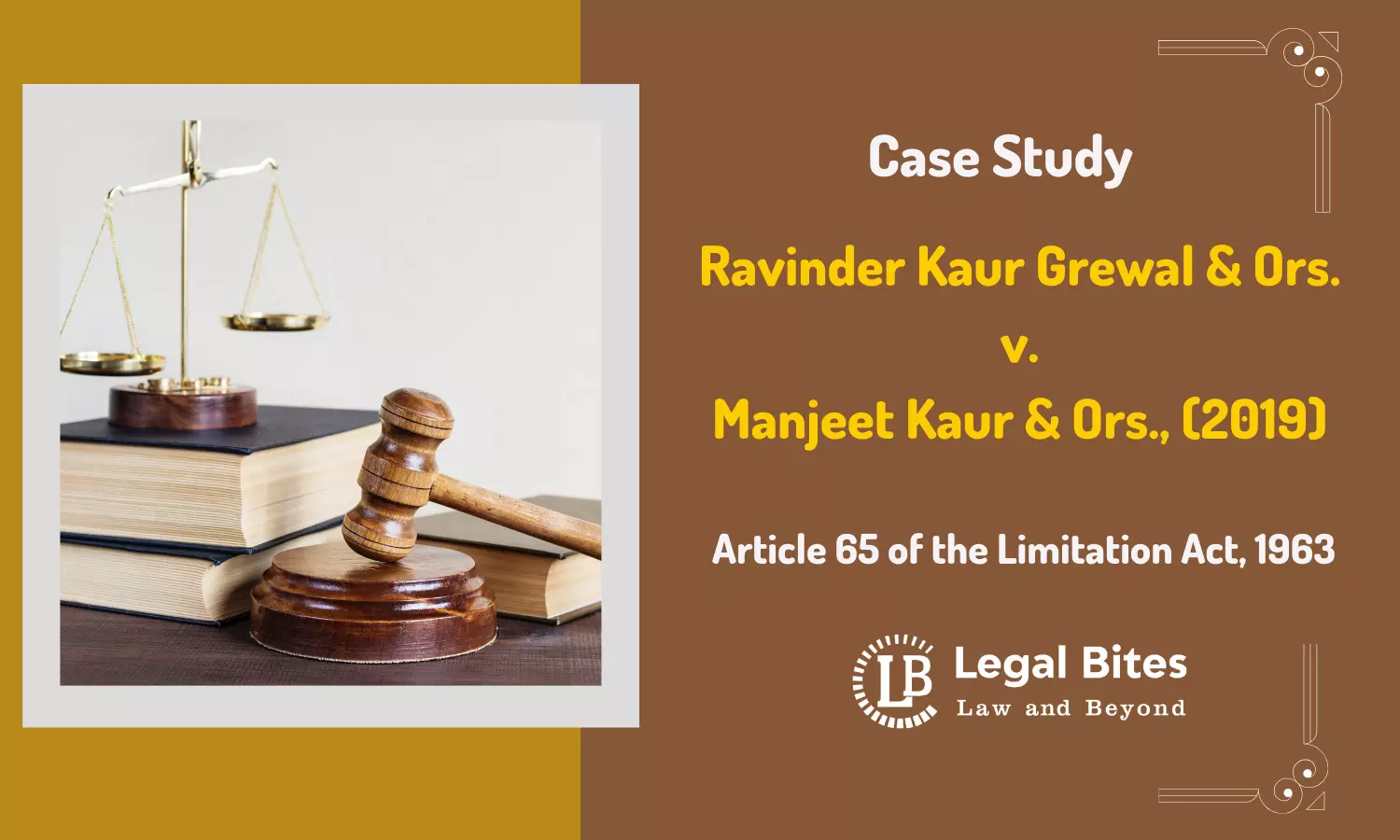Case Study: Ravinder Kaur Grewal & Ors. v. Manjeet Kaur & Ors.| Article 65 of the Limitation Act, 1963
The case of Ravinder Kaur Grewal v. Manjit Kaur (2019), pertains to the legal principle of "adverse possession" as outlined in the Limitation Act.

The case of Ravinder Kaur Grewal & Ors. v. Manjeet Kaur & Ors. (2019), pertains to the legal principle of "adverse possession" as outlined in the Limitation Act. Particularly, it examines Article 65 of the Act, which establishes a 12-year time frame for the "possession of immovable property or any interest therein based on title."
Case Title: Ravinder Kaur Grewal & Ors. v. Manjeet Kaur & Ors.
Court: Supreme Court of India
Citation: (2019) 8 SCC 729
Judges: Justice A.M. Khanwilkar, Justice Dinesh Maheshwari
Facts
- Harbans Singh filed a lawsuit against his brothers, Mohan Singh and Sohan Singh, seeking sole ownership of the property in dispute.
- According to him, a family resolution was reached which recognised his ownership, but the disputes led to a memorandum of settlement in 1988.
- However, the issues continued, leading the plaintiff to file a suit for declaration of ownership.
- The original plaintiff passed away during the suit so the appellants, his legal heirs, were brought on record.
- The trial court granted ownership of specific portions to the appellants.
- The Appellants appealed to the District Court, Sangrur, where their ownership was further confirmed along with construction on the property in dispute.
- The original respondents filed another appeal before the High Court where the decree of the lower appellate court was set aside and it was stated that the memorandum of settlement needed registration for legal enforceability against immovable property.
- The appellants filed an appeal before the Supreme Court.
Issues
- Whether one in adverse possession can sue under Article 65 of the Limitation Act for title declaration, permanent injunction, and possession restoration against a defendant, whose title is extinguished, or against another party in case of dispossession?
- Whether a person, having perfected title through adverse possession has recourse to prevent the sale and interference in possession or seek restoration if unlawfully dispossessed after the title is extinguished by the owner's subsequent sale.
- Whether it is permissible to grant an injunction to someone with no title solely based on possession, and can such an individual file a lawsuit for the removal of a trespasser?
Laws Applied
- Section 27 of the Limitation Act, 1963
- Article 65 of the Limitation Act, 1963
- Section 6 of the Specific Relief Act, 1963
- Article 141 of the Indian Constitution, 1950
Arguments Before Court
- The appellants contested that the lower court had rightly acknowledged the implementation of the memorandum of settlement after a thorough consideration of the evidence. They asserted that as the document was a simple memorandum which did not contain any comprehensive family settlement terms, registration was unnecessary.
- They further emphasised their possession of the property in dispute and also cited actions based on the settlement’s terms, invoking estoppel.
- The respondents maintained that the High Court correctly reasoned that the memorandum is a recital of family settlement terms and therefore, it required registration. They contended that without registration, the document should be deemed to be inadmissible.
- They challenged the existence of a pre-existing title and the Joint Hindu Family arrangement, which also raised concerns about the alleged forgery of the original defendants’ signatures.
Judgment
Regarding the issue of adverse possession, the court resorted to looking at the historical jurisprudence of this concept and noted that as per the concept, the ownership of the land is given to the individual who makes the “best or highest use” of the said land. It provides sufficient time for the real owner to recover the land.
The court made a note of Gurdawara Sahib v. Gram Panchayat Village Sirthala, (2014) 1 SCC 669, wherein it was expressed that a plaintiff is not entitled to seek an assertion of title based on adverse possession because it can only serve as a defence, and not as a legal tool for the plaintiff. Further in Sarangadeva Periya Matam v. Ramaswami Goundar, AIR 1966 SC 1603, it was held that the plaintiff procured the title through his adverse possession and was therefore eligible to regain the ownership.
After relying on various judgments, the court opined that “in case a person in adverse possession has perfected his title by adverse possession and after the extinguishment of the title of the true owner, he cannot be successfully dispossessed by a true owner as the owner has lost his right, title and interest.”
It was also noted that the title is acquired by adverse possession. The court made a note of Mandal Revenue Officer v. Goundla Venkaiah, (2010) 2 SCC 461, where it was observed that adverse possession can lead to the acquisition of ownership rights, effectively transferring title from the legal owner to the adverse possessor. This results in the accrual of rights in favour of the adverse possessor.
In State of Haryana v. Mukesh Kumar, (2011) 10 SCC 404, it was held that adverse possession establishes unique rights by blocking the access of the paper owner to the court. Such a legal operation extinguishes the owner’s rights while favouring the adverse possessor. The right of an adverse possessor grows through the caring and development of the paper owner’s land, in contrast with the neglect of the owner himself. This shift in the rights reflects the acknowledgement of the law of the active role of the possessor as against the passive stance of the legal owner.
Also, in Lala Hem Chand v. Lala Pearey Lal, (1942), the issue in question involved a trustee who had possession under a trust for over 12 years which was said to be legally void. The Privy Council opined that when the owner’s rights are extinguished, the claimant effectively obtains them through adverse possession. If the owner allows their rights to be barred by the limitation law, the consequential outcome is the practical elimination of their title in favour of the party in possession. This underscores the legal principle that adverse possession, when meeting the required condition, can also result in the shift of property rights, even in cases involving a void trust.
Article 65 of the Limitation Act, 1963 (hereinafter as “Act”), stipulates 12 years as the limitation period for the “possession of immovable property or any interest therein based on title” where the limitation period commences when the possession of the respondent on the land in dispute becomes adverse to the plaintiff.
The court noted that the appeal of procurement of title by adverse possession can be reserved by the claimant under Article 65. An individual who has the property cannot be expelled by any other individual except as barred under Article 65. The court observed that under Article 65 and other provisions of the Act, there is no obstruction for a plaintiff who has perfected their title through adverse possession to initiate legal action, either for eviction or safeguarding their possession.
The court further stated that there have been numerous judicial precedents which affirm that the extinguishment of the title of the owner results in the possessor attaining absolute ownership. If the actual owner displaces another person after the extinguishment of their title, the affected individual holds the right to initiate legal proceedings under Article 65 of the Act for eviction. This legal framework underlines that adverse possession, when establishing a perfected title, empowers the possessor to take legal recourse against any attempts by the original owner to dispossess them, by offering legal protection and recourse to those who have acquired ownership through adverse possession.
Law does not have the intention to deprive any individual of filing a suit under Article 65, who has perfected title, for the recovery of possession. If the owner sells the land in dispute after their title gets extinguished, then such a suit can be initiated by the individual who has perfected their title through adverse possession.
The law of adverse possession only puts a restriction on the right of the owner to recover possession before the expiry of the limitation period which is fixed for the extinction of their rights. Upon the extinguishment of the right, a prescriptive right is acquired by another individual, unreceptive to the owner's attempts at re-entry or subsequent acknowledgement of their rights. In this scenario, the affected person, whose right is under threat of being undermined, possesses the legal standing to file a lawsuit.
So basically, the right to possession is transmissible as by re-entry, the adverse possession can be defeated, the only bar being is Article 65 of the Act, after which the right of the proper owner is extinguished under Section 27 of the Act and after such time, re-entry is not permitted. Adverse possession necessitates the simultaneous fulfilment of three criteria: adequate in continuity, adequate in publicity, and adverse to a competitor. Adverse possession claims mustn't be viable unless the title is explicitly pleaded.
All in all, this clarification provided by the court turned out to be in favour of the appellants. It was also held that the memorandum of settlement did not require registration, and thus, the appeal was allowed.

